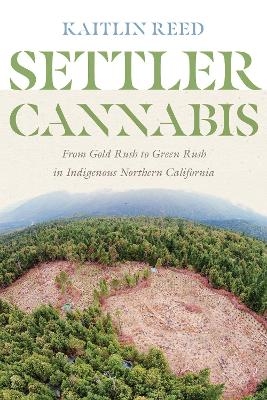
Settler Cannabis
From Gold Rush to Green Rush in Indigenous Northern California
Seiten
2023
University of Washington Press (Verlag)
978-0-295-75156-6 (ISBN)
University of Washington Press (Verlag)
978-0-295-75156-6 (ISBN)
Connects California cannabis production to the violence and dispossession of Indigenous land and people
Young countercultural back-to-the-land settlers flocked to northwestern California beginning in the 1960s, and by the 1970s, unregulated cannabis production proliferated on Indigenous lands. As of 2021, the California cannabis economy was valued at $3.5 billion. In Settler Cannabis, Kaitlin Reed demonstrates how this "green rush" is only the most recent example of settler colonial resource extraction and wealth accumulation. Situating the cannabis industry within this broader legacy, the author traces patterns of resource rushing—first gold, then timber, then fish, and now cannabis—to reveal the ongoing impacts on Indigenous cultures, lands, waters, and bodies.
Reed shares this history to inform the path toward an alternative future, one that starts with the return of land to Indigenous stewardship and rejects the commodification and control of nature for profit. Combining archival research with testimonies and interviews with tribal members, tribal employees, and settler state employees, Settler Cannabis offers a groundbreaking analysis of the environmental consequences of cannabis cultivation that foregrounds Indigenous voices, experiences, and histories.
Young countercultural back-to-the-land settlers flocked to northwestern California beginning in the 1960s, and by the 1970s, unregulated cannabis production proliferated on Indigenous lands. As of 2021, the California cannabis economy was valued at $3.5 billion. In Settler Cannabis, Kaitlin Reed demonstrates how this "green rush" is only the most recent example of settler colonial resource extraction and wealth accumulation. Situating the cannabis industry within this broader legacy, the author traces patterns of resource rushing—first gold, then timber, then fish, and now cannabis—to reveal the ongoing impacts on Indigenous cultures, lands, waters, and bodies.
Reed shares this history to inform the path toward an alternative future, one that starts with the return of land to Indigenous stewardship and rejects the commodification and control of nature for profit. Combining archival research with testimonies and interviews with tribal members, tribal employees, and settler state employees, Settler Cannabis offers a groundbreaking analysis of the environmental consequences of cannabis cultivation that foregrounds Indigenous voices, experiences, and histories.
Kaitlin Reed (Yurok/Hupa/Oneida) is assistant professor of Native American studies at Humboldt State University.
| Erscheinungsdatum | 15.07.2023 |
|---|---|
| Reihe/Serie | Settler Cannabis |
| Mitarbeit |
Herausgeber (Serie): Charlotte Coté, Coll Thrush |
| Zusatzinfo | 3 b&w illus. |
| Verlagsort | Seattle |
| Sprache | englisch |
| Maße | 152 x 229 mm |
| Gewicht | 386 g |
| Themenwelt | Sachbuch/Ratgeber ► Geschichte / Politik ► Regional- / Landesgeschichte |
| Geisteswissenschaften ► Geschichte ► Regional- / Ländergeschichte | |
| Geschichte ► Teilgebiete der Geschichte ► Kulturgeschichte | |
| Naturwissenschaften ► Biologie ► Ökologie / Naturschutz | |
| Sozialwissenschaften ► Ethnologie | |
| Sozialwissenschaften ► Soziologie | |
| ISBN-10 | 0-295-75156-8 / 0295751568 |
| ISBN-13 | 978-0-295-75156-6 / 9780295751566 |
| Zustand | Neuware |
| Haben Sie eine Frage zum Produkt? |
Mehr entdecken
aus dem Bereich
aus dem Bereich
der stille Abschied vom bäuerlichen Leben in Deutschland
Buch | Hardcover (2023)
C.H.Beck (Verlag)
23,00 €
vom Mittelalter bis zur Gegenwart
Buch | Softcover (2024)
C.H.Beck (Verlag)
12,00 €


